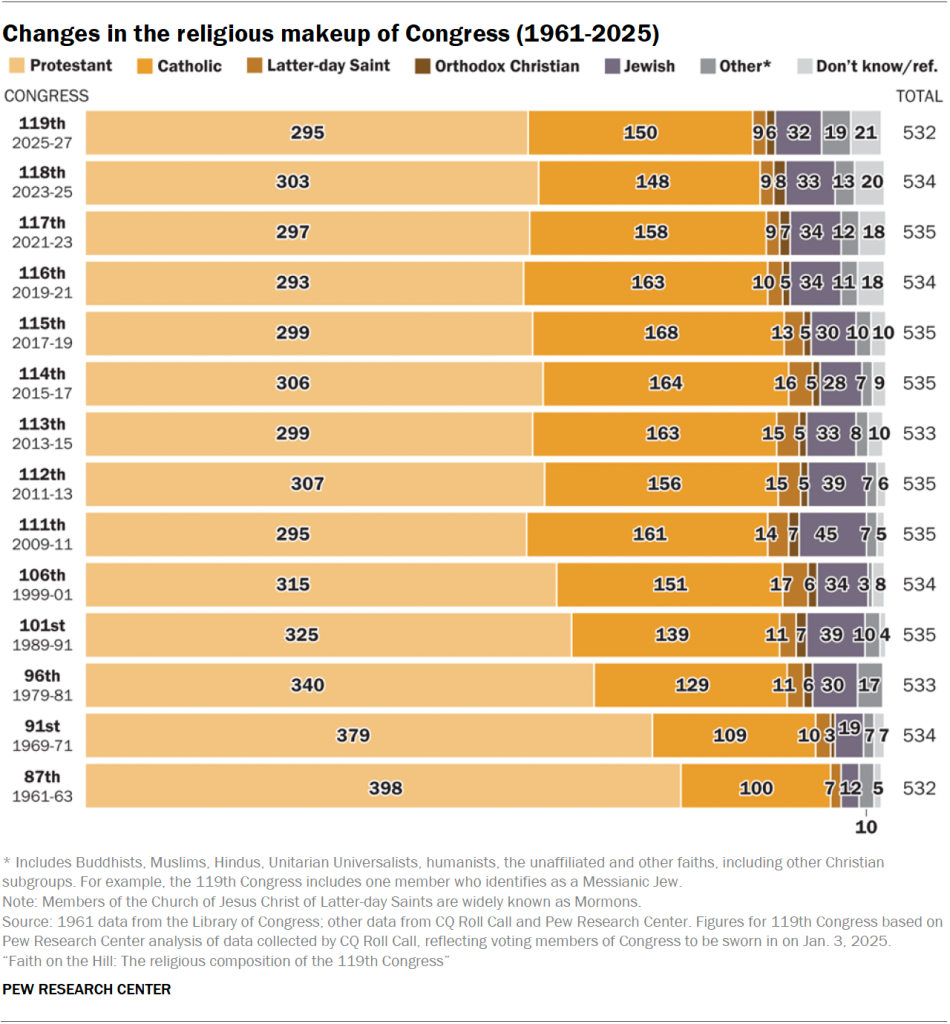➕ Table of Contents
The composition of the 119th U.S. Congress by religious affiliation, analyzed by Pew Research Center, has reignited critical discussions about Ukraine’s use of soft power tools in international relations. Despite being the most Protestant country in the post-Soviet space, Ukraine has consistently failed to leverage its Protestant communities to advocate for national interests abroad. Even during pivotal moments of national struggle, this potential remains largely untapped.
Ukraine: A Protestant Stronghold in Eastern Europe
Despite Protestantism being a minority religion in Ukraine, representing around 2% of the population (approximately 600,000–700,000 individuals), the country boasts one of the largest Protestant populations in the post-Soviet space. This is particularly notable in the context of the Evangelical Baptist Union of Ukraine, the largest Protestant community in the country. Prior to 2022, Ukraine also ranked highly in Europe for its Baptist population. However, Ukrainian leadership has largely overlooked the potential of these communities as bridges to Western allies, especially in the United States, where Protestantism plays a significant role in shaping public and political discourse.
Missed Opportunities on the Global Stage
As Mykola Malukha, Director of the YouTube channel "Ціна держави," aptly highlights, Ukraine's political leadership has repeatedly failed to engage Protestant communities strategically, missing crucial opportunities such as the annual National Prayer Breakfast in Washington. This major event in the U.S. political calendar brings together the entire American political establishment, including the President, with predominantly Protestant religious leaders. It provides a unique platform to foster relationships and build advocacy networks, yet Ukraine’s representatives at these gatherings have often been "random deputies" with little understanding of Protestantism or its cultural markers. This shortsighted approach, as Malukha explains, has hindered meaningful dialogue with influential figures in U.S. politics.
Even during Oleksandr Turchynov's tenure—when Ukraine had a Protestant figure in a key leadership position—systematic collaboration with Protestant unions for foreign advocacy was absent. This lack of strategy has been especially glaring during times of war when mobilizing all societal and international resources is crucial, Malukha states.
At the 2023 and 2024 events, Ukraine’s delegation consisted of politicians who were not only unfamiliar with Protestantism but appeared indifferent to religious matters altogether. Simple gestures, such as asking Speaker of the House Mike Johnson to pray for peace in Ukraine, could have initiated meaningful dialogue and strengthened ties with influential figures. Unfortunately, these opportunities were squandered due to a lack of preparation and understanding, leaving Ukraine without a stronger foothold in such a critical diplomatic arena.
U.S. Congress: A Protestant Majority
The religious composition of the U.S. Congress underscores why engagement with Protestant leaders could be a strategic asset for Ukraine. Protestants constitute over half of Congress across both chambers and represent the largest religious group within each party. This demographic reality makes religious dialogue a potentially effective channel for advocacy, particularly when legislative support for aid packages is at stake.

A Call for Strategic Religious Engagement
Ukraine’s Office of the President began to acknowledge the importance of this dimension only after delays in U.S. aid caused severe consequences on the battlefield. While some efforts have been made, much remains to be desired. A well-planned strategy that integrates religious diplomacy could amplify Ukraine's voice in Washington and help secure sustained support.
Some actionable steps include:
- Tailored Delegations: Ensuring Ukrainian representatives at events like the National Prayer Breakfast are well-versed in Protestant culture and prepared to engage meaningfully.
- Religious Outreach Programs: Establishing formal collaborations with Ukrainian Protestant unions to strengthen ties with their U.S. counterparts.
- Symbolic Gestures: Incorporating faith-based narratives and actions into public diplomacy to resonate with American Protestant leaders and communities.
Enhancing Ukrainian Advocacy: Data Insights
To underscore the need for strategic engagement, consider these figures:
- Pew Research Data: Protestants make up 56% of the 119th Congress, with Baptists and Methodists being prominent groups.
- Aid Correlation: In 2023, congressional debates delayed a significant aid package, highlighting the need for stronger lobbying efforts.
Additionally, Ukraine can draw inspiration from other nations that successfully use cultural and religious diplomacy. For example, Israel’s engagement with U.S. Jewish communities exemplifies how diaspora networks can shape foreign policy outcomes.
As Ukraine navigates the challenges of war and reconstruction, it cannot afford to overlook the soft power potential of religious diplomacy. Leveraging its Protestant heritage and engaging with American religious leaders could open new avenues for support, fostering a deeper and more sustainable partnership with the United States. With strategic vision and preparation, Ukraine can transform these missed opportunities into enduring strengths.
Protestantism in Ukraine represents a minority within the religious landscape, with approximately 2% of the population identifying as Protestant. This equates to about 600,000 to 700,000 individuals. The Evangelical Baptist Union of Ukraine stands as the largest Protestant community, alongside other denominations such as Pentecostals, Seventh-day Adventists, Lutherans, Anglicans, Calvinists, Methodists, and Presbyterians. Despite their relatively small numbers, Protestant communities have been active in Ukraine's religious, cultural, and social spheres, contributing to the country's diverse religious tapestry.

 DE
DE  RU
RU  UK
UK 